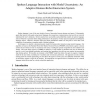Free Online Productivity Tools
i2Speak
i2Symbol
i2OCR
iTex2Img
iWeb2Print
iWeb2Shot
i2Type
iPdf2Split
iPdf2Merge
i2Bopomofo
i2Arabic
i2Style
i2Image
i2PDF
iLatex2Rtf
Sci2ools
120
click to vote
CONNECTION
2008
2008
Spoken language interaction with model uncertainty: an adaptive human-robot interaction system
Spoken language is one of the most intuitive forms of interaction between humans and agents. Unfortunately, agents that interact with people using natural language often experience communication errors and do not correctly understand the user's intentions. Recent systems have successfully used probabilistic models of speech, language, and user behavior to generate robust dialog performance in the presence of noisy speech recognition and ambiguous language choices. However, decisions made using these probabilistic models are still prone to errors due to the complexity of maintaining a complete model of human intentions. In this paper, we describe a decision-theoretic model for human-robot interaction using natural language. Our algorithm is based on the Partially Observable Markov Decision Process (POMDP), which allows agents to choose actions that are robust not only to uncertainty from noisy or ambiguous speech recognition but also unknown user models. Like most dialog systems, ...
CONNECTION 2008 | Natural Language | Partially Observable Markov Decision Process | Probabilistic Models |
Related Content
| Added | 09 Dec 2010 |
| Updated | 09 Dec 2010 |
| Type | Journal |
| Year | 2008 |
| Where | CONNECTION |
| Authors | Finale Doshi, Nicholas Roy |
Comments (0)

